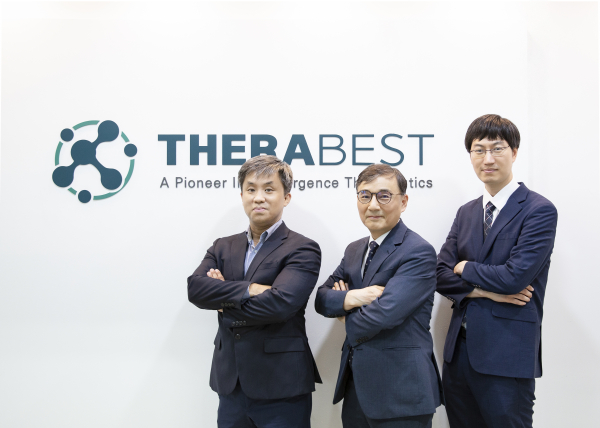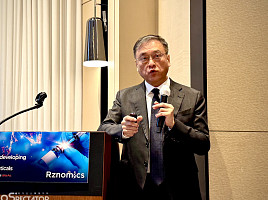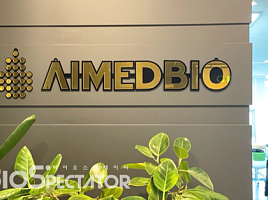기사본문
THERABEST, Strategy of New Drug Development Based on iPSC·Nano-Platform
입력 2020-09-14 18:06 수정 2020-09-14 18:06
by Jongwon Jang

▲테라베스트의 김신일 CSO(왼쪽부터), 기평석 CEO, 황도원 CTO.
THERABEST is a ‘biotech venture business’ challenging development of new drugs through exploiting its unique platform, specified for the fields of cell therapy products and nano-convergence integrated therapeutics. The company has expanded its field of research by developing platforms of products of iPSC and nano-convergence integrated therapeutics, as well as developing the platform for the autoimmune cell therapy products.
① Development of Therapeutics for the Atopic·hepatocirrhosis Through the EBI-H Platform
The EBI-H platform comprises the technology enabling the mass culture of the immunocyte embracing the capabilities of controlling the immune system (chronic inflammation) by adding the cell activating ‘Special Factor’ to the culture technology for the existing immunocyte (CIK Cell) that promotes the anticancer capability.
The EBI-H process comprises the following processes: blood collection and separation of the PBMC (peripheral blood mononuclear cell) → primary processing of cell activating ingredient → immunological activation (mass manifestation of IFN-gamma, NKG2D) → secondary processing of the ingredient for cell proliferation → mass culture (multiplication of the cell count by more than 100 times) → separation, purification, and administration.
The cell therapy products, produced through this procedure, secrete the key factors capable of controlling the immune system (chronic inflammation) by more than 10 times compared to the conventional cell therapy products.
THERABEST currently runs the phase 1/2a clinical trial of EBI-01 for patients suffering from severe atopic disorder through the EBI-H platform. The EBI-01 exhibited an improvement in skin damage by more than 75% through the reduction in the Th2-originated inflammatory materials (IL-4, 5, 13, 25, 33) and the level of ‘Mast cell IgE’ with the mouse model. Additionally, it also exhibited an improvement of more than 80% (canine study) in the research of the efficacy of the EBI-01 in a natural atopic environment. The resulting rate of recurrence remained on the level of 5% (1/20).
THERABEST is currently preparing for the clinical trial of the EBI-02 for patients suffering from hepatic cirrhosis. The protocol for the phase I clinical trial of the EBI-02 which will be filed at the fourth quarter of this year is also scheduled.
② Development of the New Platform for Nano-Convergence Integrated Therapeutics
THERABEST is currently developing the two platforms of the nano-convergence integrated therapeutics, as platforms for the development of the next-generation new-drugs. The platforms are the ‘Rocket Delivery’ and ‘Nano-Dressing’ platforms of the technology enabling the sustaining of the activity of the immuno-cytological therapeutics specific for the cancer environment.
The ‘Rocket Delivery’ platform renders the nano-therapeutics wherein the ‘Responsive Linker’ and drug are linked to each other in the format of the ‘self-assembly’. Through this, the efficiency of the drug delivery and of reaching (parts of) the lesions have improved significantly, thereby the low delivery efficiency of conventional low-molecular compounds, lower level of in vivo distribution, lower therapeutic effect, and higher level of adverse effect, were ameliorated.
The platform also features drug loading efficiency of more than 90% (comparing to approximately 10% of the conventional platform). Besides, the platform enables an accurate delivery of drugs in the tumor environment by coating of the substance targeting ‘X Ligand’ present, manifested excessively in the environment of the tumor or inflammation.
Hwang Do-won, the CTO of THERABEST, explained, “… We have completed the mass production process through an introduction of equipment capable of rendering uniform nano-sized particles…”, “… We intend for the transfer of the technology upon completion of pre-clinical trials with the application of the technology to anticancer agents, of which patent have been expired or to be expired….”.
Another platform of THERABEST, the ‘Nano-Dressing’ platform, is the state-of-the-art convergent and integrated technology combining the technology for cells with the nano-technology, by which the conventional therapeutic functionality of cells has improved significantly. The technology enables the fabrication of the core of the RBM substance that exhibits the efficacy adjusting the VEGF manifestation, wherein the immuno-activation agents are loaded by which they decompose promptly in the environment of the cancer or inflammation.
③ Development of the Next-Generation 'iPAD Platform' Based on iPSC
THERABEST also develops the ‘iPAD (iPSC-Advanced Differentiation) Platform’, based on the iPSC. The technology of the ‘iPAD Platform’ promotes the differentiation of cells of interest from the iPSC by which the problems associated with expensive conventional autoimmune cell therapy products can be resolved.
For the development, THERABEST invited Kim Shin-il as CSO of the company. CSO Kim acquired his doctoral degree (Ph.D) from Wisconsin University, and careered the course of post-doctoral research at California University. In 2012, he participated in the ‘Center of iPS Cell Research and Application’ at Kyoto University as a post-doctoral researcher and as an assistant professor, wherein the Nobel Prize (in Physiology) Winner Professor Shinya Yamanaka was present.
CSO Kim stated, “…. Currently, we are developing the ‘iPAD Platform’ for which the gene editing technology will be introduced to maximize the functionality of the platform…”, “… diverse kinds of therapeutics, originated from iPSC such as CAR-NK and CAR-T etc., are being developed…”. Gi Pyeong-seok, the president of THERABEST, emphasized, “… We are intending for the popularization of cell therapy products through exploiting the ‘iPSC Platform’, by which the real value of cell therapy products for cancers or for the dementia of Alzheimer’s type will be emerging.”.







